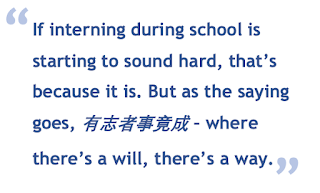How to Balance a Full Course load at the HNC with an Internship
Master of Arts in International Studies (MAIS) student Albert Heidecke shares his best tips on balancing a full course load with an internship while studying at the Hopkins-Nanjing Center.
Just like any graduate program, the Hopkins-Nanjing Center attracts students who have a wide range of professional and academic backgrounds. Some students may have nearly a decade of work experience, while others may have only finished undergraduate study just before matriculating at the HNC.
I could spend an hour talking about the merits of going straight to graduate school after undergrad or taking time off to gain work experience – but that’s for another blog post. The fact is that work experience is important. To play off the old phrase: 工作经验不是万能的,但没有工作经验是万万不能的 – work experience isn’t everything, but you must have some.
Most MAIS students at the HNC opt for interning full-time during the summer months between their first and second year, and for many people that’s enough. But if you’re like me, two to three months of full-time work isn’t enough to ease concerns of being stuck with entry-level jobs post-graduation. There’s a natural solution to this conundrum, and that’s to intern part-time while in school.
Why do such a thing?
1. Better chances of scoring a great internship: During the academic year, less people are looking for internships. This means hiring managers are filtering through less applications.
2. More internships: If you choose to only pursue an internship during the summer months, you’re probably stuck with only one internship. By interning year-round, you can explore more opportunities that you may have not considered if you were only planning on one internship.
3. More work experience: Needless to say, you’ll have more work experience if you take on more internships.
4. Because we can: The COVID-19 pandemic has normalized remote work. There are more opportunities than ever before to carry out a remote internship from anywhere.
But there’s a critical aspect of making the leap into part-time-potentially-unpaid-intern life while enrolled full time at the Hopkins-Nanjing Center that cannot be overlooked: balance. Being a graduate student is very much like a full-time job, and it is of the upmost importance to treat it as such.
By taking on internships during school, you run the risk of spreading yourself too thin. Loading up on too many responsibilities may leave you in a desperate scramble to stay on top of your studies, school projects, assignments, and work obligations. Inevitably, this will affect the quality of your work and the quality of your learning.
If interning during school is starting to sound hard, that’s because it is. But as the saying goes, 有志者事竟成 – where there’s a will, there’s a way.
Here’s what I’ve learned while trying to balance my part-time 20 hours per week with school and a work-study job at the HNC:
Consider your time commitments. Before you commit to your new busier-than-ever lifestyle, plan meticulously. It’s said that every hour of class should correspond to two hours of study. That means three hours for each of the HNC’s one-and-a-half hour courses. Don’t forget that you need to actually go to class as well. And remember that you’ll have homework that falls outside of study time. So, if you’re taking four classes at the Hopkins-Nanjing Center, prepare to spend at least 18 hours in class and studying. To be safe, round that up to twenty hours.
Draft a daily schedule. If you’d like to retain your weekend, then you’re looking at an average of four hours of school and study Monday through Friday, at least. Don’t forget that you need to set aside seven to eight hours for your beauty sleep, time for three square meals and a gym session. Draft a daily schedule, and stick to it. Be honest with yourself about the limitations of your daily schedule and how well you’ll be able to stick to it.
Communicate with your prospective employers. Be honest with your prospective employers about how much time you can commit to interning with them. If you can’t stomach more than 15 hours per week, you should under no circumstance tell them that you can work 20 hours. It’s important to define the terms of your professional relationship with your employer before you start the internship. Nobody wants an intern that’s flip-flopping on their time commitment to the company.
Apply for internships that are relevant to your study. Finding internships that are relevant to your study at the Hopkins-Nanjing Center will make it easier to ‘switch gears’ between work and study. If your work has a China focus or opportunities to utilize your Chinese language skills, you may find that there is a naturally occurring overlap between your studies at the HNC and your work responsibilities. You can use what you learn at work to aid you at school and use what you learn in school to aid you at work – 活学活用.
Taking on a part-time internship while studying full-time at the HNC isn’t easy, but the potential rewards are huge. More experience, more hands-on learning, and a head-start on your career.
If you’re thinking about taking on a part-time internship, consider visiting the Career Center to talk about developing your own strategy for success.





